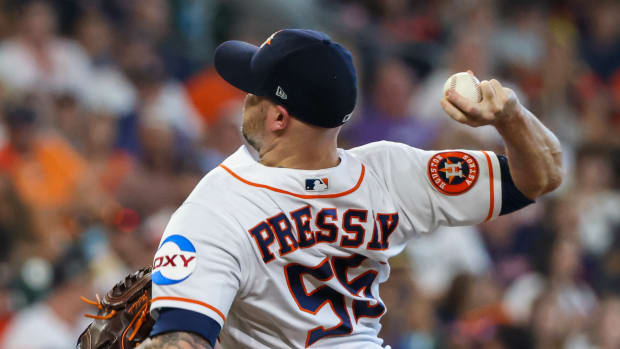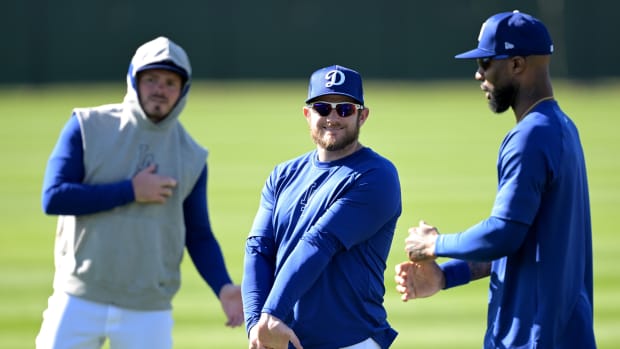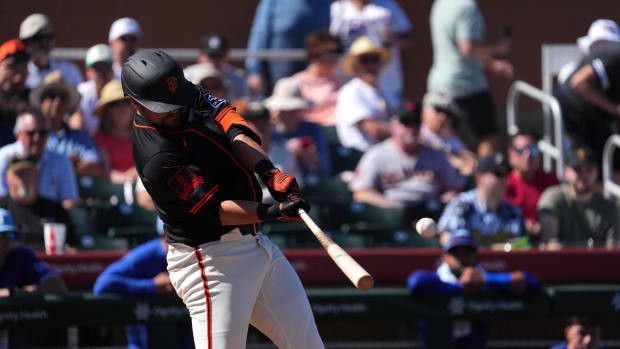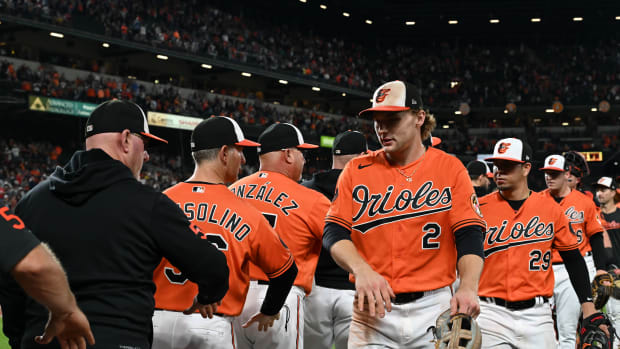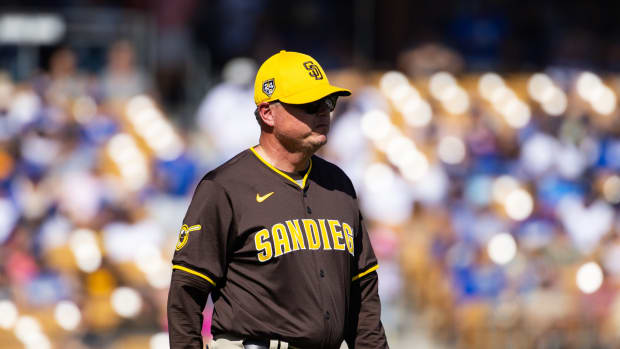Get To Know a New Manager: The Reds Look to David Bell to Help Escape Their Interminable Rebuild
If it’s not the Yankees, managerial hires usually get little national fanfare, and they happen when most baseball fans are fully invested in the postseason. As a result, SI’s MLB staff will be introducing you to the six new faces in charge of MLB franchises. Of the six openings that occurred at season’s end, only the Orioles have yet to fill their vacancy. Next up: David Bell
Previous editions: Brad Ausmus (Angels), Rocco Baldelli (Twins)
Team
Name
David Bell
Who did he replace?
Bryan Price (and Jim Riggleman). Price managed the Reds for four losing seasons from 2014 to 2017. He began 2018 in the same role but was fired after a 3–15 start. Interim manager Riggleman went 64–80.
Who did he beat out?
Before discussing who Bell “beat out,” it’s important to note that he wasn’t the Reds’ first choice for the job. That would be former Yankees manager Joe Girardi. Ken Rosenthal reported on Oct. 17 that Cincinnati’s final three consisted of Girardi, Bell and Ausmus. Two days later, top choice Girardi had pulled his name out of the running. There are some who speculate that Girardi, who apparently wants to manage again, is waiting a year to see if an opening arises in Chicago. When Girardi withdrew, it became pretty clear the Reds would hire Bell. Ausmus, of course, ended up with the Angels. Other candidates who were initially considered in a thorough search included Riggleman and former Red Sox skipper John Farrell.
DICKEY: The Hidden Scandal Within MLB's Cindy Hyde-Smith Donation
Playing career stats
Bell played for six different teams during a 12-year MLB career. Primarily a third baseman who also spent time at second, Bell was a solid if unspectacular right-handed hitter. He made his major league debut with the Indians in 1995 and ended his career with the Brewers in 2006. His best years were 1999 (.268, 21 HRs with the Mariners), 2002 (.261, 20 HRs with the Giants), and 2004 (.291, 18 HRs with the Phillies). Bell played in the postseason with the Mariners in 2000 and 2001, and with the Giants in 2002, where he homered in both the NLCS and the World Series. He hit for the cycle in 2004.
Prior Job
Bell spent last season in the Giants’ front office as the vice president of player development. That was a change of pace for him from a professional standpoint, as Bell had spent the previous nine seasons as a coach. He was a manager for Reds’ minor-league affiliates from 2009 through 2012, third base coach for the Cubs in 2013, and spent four years with the Cardinals, first as an assistant hitting coach and then as bench coach under Mike Matheny.
What to Expect
Though Girardi would have been a flashier hire, there’s a lot to like about what Bell will bring to the table. For starters, he’s very familiar with the organization. Bell is a Cincinnati native, managed in the organization and is part of a family with deep ties to the Reds. His father, Buddy, is a vice president in the front office and played for the Reds in the 80s. Buddy’s father Gus was a four-time all-star in the 50s, back when the team was named the Redlegs. Even David’s younger brother Mike appeared in 19 games as a Red in 2000. That background could understandably lead to claims of nepotism, but such claims are hard to support given that Buddy Bell recused himself from interviews with his son and because Bell’s résumé makes him a deserving candidate for a major league managerial role.
The 46-year-old Bell fits with the recent trend of hiring young managers not too far removed from their playing days, although he has even more coaching experience than the likes of AJ Hinch, Dave Roberts and Alex Cora did when they were hired. Bell’s year in the Giants’ front office is an added bonus. He understands and embraces analytics and will strive for a close connection between GM Dick Williams, the Reds’ analytics staff and his coaching staff and players in an attempt to finally pull the organization out of its current rut.
The Situation
The Reds are stuck in a rebuild that never materialized. They’ve won between 64 and 68 games in each of the past four years after making the playoffs in 2010, 2012 and 2013. They have an offense that ranked in the middle of the league in 2018 in both traditional stats like runs and advanced metrics like WRC+ and WAR. Their downfall is a truly awful pitching staff that has ranked towards the bottom of the league for five straight seasons.
There’s enough talent on this roster and in the Reds’ farm system to think that if they make smart moves and some young pieces pan out, this team could be a contender in a year or two. The star of the lineup is Eugenio Suarez, the 27-year-old third baseman who broke out with 34 homers and a 135 OPS+ last season. In Suarez, Jose Peraza, Scooter Gennett and the ageless Joey Votto, the Reds have about as good of an offensive infield as you’ll find. The outfield isn’t as much of a strength at the plate. His otherworldly speed provides value on the bases and on defense, but Billy Hamilton simply can’t hit consistently. Jesse Winker and Scott Schebler are merely solid offensively. For the Reds to have any chance at making a leap in 2019, they need to upgrade their mess of a rotation this offseason. Luis Castillo had a disappointing second season, though his ceiling remains high given his strikeout ability. Asking any of Sal Romano, Tyler Mahle and Anthony DeSclafani to be anything more than mediocre is asking too much. Homer Bailey made $21 million to go 1–14 with a 6.09 ERA and has one more year on his contract.
TAYLER: The Braves Make a Great Gamble by Signing Josh Donaldson
It will be interesting to see if the Reds make any major moves this winter or mostly stay put. They could decide to trade someone like Hamilton or Gennett. Free agent Matt Harvey—who had some strong stretches in 2018—could be brought back. For a splash move to be made, Cincinnati would likely have to include a top prospect like Nick Senzel, Taylor Trammell or Hunter Greene. That seems unlikely, since the Reds don’t figure to contend in a tough NL Central next season. The more probable approach is that they make some small-to-medium moves to upgrade their staff and hope to contend in 2020 or 2021 when top prospects join the big-league club.
Should fans be excited?
Reds fans have been through a lot of losing over the past half-decade, and Bell isn’t going to turn this team into a winner overnight. That said, this is a promising hire. Bell is experienced, versed in analytics and deeply connected to the Queen City. He’ll have plenty of talented bats at his disposal and several more coming up through the minor leagues. The onus is on Williams to provide his new manager with some competent pitching.































